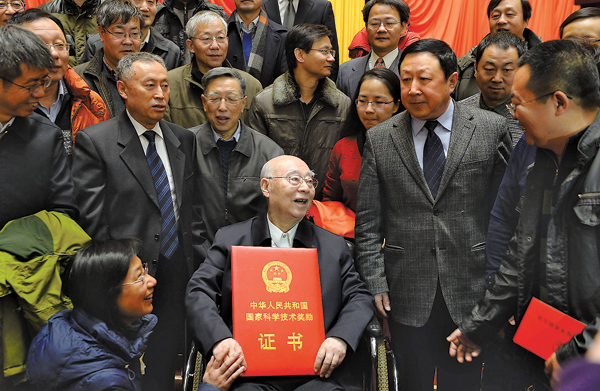H-bomb work nets scientist top award
By LUO WANGSHU (China Daily) Updated: 2015-01-10 05:23
 |
|
Nuclear physicist Yu Min is congratulated in Beijing on Friday after landing China’s top science award. Yu, 89, has played a crucial role in the country’s nuclear weapons design. ZHOU WEIHAI / FOR CHINA DAILY |
Nuclear physicist Yu Min given 5 million yuan reward for work on design of nuclear weapons
Nuclear physicist Yu Min won China's top science award on Friday for his outstanding contribution to the country's hydrogen bomb research.
The award, given annually since 2000, honors scientists who make a major contribution to China's scientific and technological development and achieve key breakthroughs in cutting-edge scientific and technological fields.
Twenty-five distinguished scientists have won the top award since 2000. It is presented to no more than two scientists annually.
Yu, 89, won an award of 5 million yuan ($826,000).
He has played a crucial role in the design of China's nuclear weapons, and is one of 23 recipients of the Two Bombs, One Satellite Achievement Medal, the country's top award to scientists contributing to China's nuclear and satellite projects.
Like Yu, many other recipients were unknown until presented with the award, including nuclear weapons experts Sun Jiadong in 2010 and Cheng Kaijia last year.
The award recognized their contributions and made them role models for young researchers.
Besides Yu, seven foreign scientists and one overseas organization have won the International Science and Technology Cooperation Award.
Meanwhile, 318 scientific and technological research projects have received State scientific and technological awards.
"The awards, as a trustful third-party evaluation system, aim to encourage researchers to continue their hard and meaningful work," said Chen Zhimin, director of the Office for Science and Technology Awards.
Chen added that the awards act as effective guidance for scientific researchers.
Academic integrity was one of the key factors for the evaluation committee when it reviewed the projects this year.
"We found suspicious projects involving academic dishonesty during the review and dealt with the situation accordingly — some were disqualified from receiving the award this year, " Chen said.
This year's award encourages researchers to concentrate on studies instead of rushing to apply for awards.
"To win recognition, some researchers focus on winning awards instead of concentrating on their studies. They repeatedly apply for the award and some apply with more than one project," Chen said.
Beginning this year, one lead researcher is limited to a single project application each year.
This year's awards projects took 10 years and seven months to complete on average, from initial proposal to finalization. One project that focused on Chinese amphibian studies took 49 years.
Zhou Qi, a developmental biologist from the Institute of Zoology at the Chinese Academy of Sciences, strongly agreed with the emphasis on academic integrity.
"Research is a process of accumulation. Being responsible for research outcomes is the duty of scientists," Zhou said.
"I always told my students that you have many opportunities to publish a new paper in your academic life, but it is impossible to withdraw any of your publications with a bad record from your resume.
"So take every experiment seriously and make sure every result is reliable. It is a must in research," Zhou said.
In academic life, one fabrication may lead to a long-term lapse in the researcher's career, but it might also have an impact on the entire research field, Zhou added.
Zhou's team won an award in the natural science field this year.
In 2014, Haruko Obokata, a Japanese stem-cell biologist, authored stem-cell research papers that had to be retracted because of falsified content.
Her supervisor, senior development biologist Yoshiki Sasai, committed suicide in August.
- Govt encourages people to work 4.5 days a week
- Action to be taken as HIV cases among students rise
- Debate grows over reproductive rights
- Country's first bishop ordained in 3 years
- China builds Tibetan Buddhism academy in Chengdu
- Authorities require reporting of HIV infections at schools
- Typhoon Soudelor kills 14 in East China
- Police crack down on overseas gambling site
- Debate over death penalty for child traffickers goes on
- Beijing to tighten mail security for war anniversary







